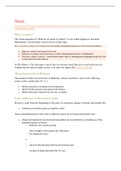Nature
What is nature?The natural world in BohemiaEarly references to the natural worldNature associated with
virtueDestructive nature
What is nature?
The whole question of ‘What do we mean by nature?' is one which appears to fascinate
Shakespeare. Several plays seem to focus on the topic.
More on nature in King Lear: In King Lear for example, Shakespeare presents us with several possibilities:
• Edgar is a ‘natural' son because he is kind
• Edmund is a ‘natural' son in the sense, current in Shakespearean times, of ‘illegitimate'
• The Fool is called a ‘natural' – a word which meant ‘idiot' in Shakespearean language (though the Fool
in King Lear has innate wisdom).
In The Winter's Tale the topic is not at first so obvious, but if the text is read with care it is
evident that the idea of nature occurs over and over again (See: Ideas of nature).
The natural world in Bohemia
The natural world is most obvious in Bohemia, whose court life is never seen. The king
comes to the countryside (IV. iv.):
• Where everyone is involved in the farming life
• Where Perdita presents her guests with flowers
• Where that great natural force, the sea, is nearby.
Early references to the natural world
However, right from the beginning of the play we encounter images of nature and natural life:
• Polixenes and Leontes grew up together, when
‘there rooted betwixt them then such an affection which cannot choose but branch now.'
• Sheep and shepherds are mentioned long before we reach Bohemia, reminding us of the
beneficent power of nature
o Polixenes' first words are that
‘Nine changes of the watery star ‘hath been
The shepherd's note'
•
o Later he tells Hermione that he and Leontes were
‘as twinn'd lambs that did frisk i' th' sun.'
, Nature associated with virtue
The association of nature with innocence and goodness becomes more significant later in The
Winter's Tale:
• Paulina (in Act II, sc ii) insists to the gaoler that Hermione's child ‘is / By law and process of
great nature' freed from the womb
• She then goes on to speak vehemently to Leontes (Act II, sc iii) of ‘good goddess nature'
which has made the baby so like her father in external features.
Destructive nature
Nature is not always beneficent. It is a powerful force, and can be destructive, for example:
• The bear that tears Antigonus apart
• The storm that wrecks his ship
• The potentially destructive power of human nature as seen in the effects of Leontes'
jealousy.
•
Ideas of nature
Nature and nurtureThe nature / nurture debate in The Winter's TaleGentle natureMamillius and
PerditaAntigonusThe ShepherdsArt versus NatureWhat is ‘art'?Natural purity versus artificial beauty (Act IV, sc
iv)Nature versus artifice (Act V, sc iii)
Nature and nurture
The ‘nature versus nurture' debate is of long standing, going back at least to the time of Plato.
Currently, developments in psychology and also much more detailed knowledge about our genetic
make-up have contributed to the discussion.
Basically, the arguments concern the extent to which our personality and skills
are naturallyinherited, and the extent to which they depend on our upbringing, or nurture.
Obviously both are important: we are undeniably born with certain
characteristics, but equally obviously we learn at least some of our behaviour. This is clear from, for
example, the study of feral (that is, ‘wild') children such as the two girls found living with wolves in
India in the 1920s, who, because of their nurture, behaved like animals in many ways even though
they had been born to human parents.





